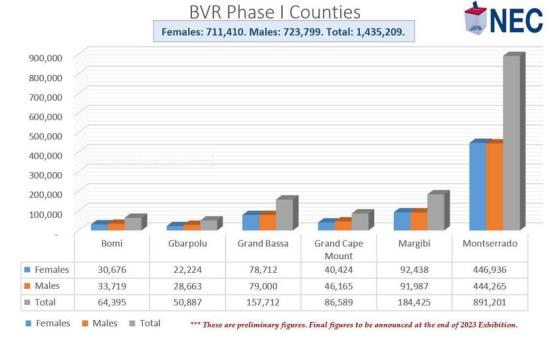Over 1.4 million Liberians Registered to Vote in 2023 Elections

— “Preliminary results of phase one show a total of 1,435,209 registered voters. Of this number, 711,410 are females while 723,799 are males,” NEC Chair, Davidetta Browne-Lansanah disclosed.
The National Elections Commission (INEC) says the preliminary number of registered voters in the first phase is a little over 1.4 million people.
The first phase, which took place in six of the country's fifteen counties, was marred by technical glitches, including shortages of biometric cards that prevented some Liberians from registering.
However, the electoral body has claimed that the overall impact of the technical glitches on the turnout of the biometric voter registration exercise was minimal.
But electoral experts disagree, saying that the total number of registered voters in the first phase would have been higher if the problems had existed throughout the registration period.
“Preliminary results of phase one show a total of 1,435,209 registered voters. Of this number, 711,410 are females, while 723,799 are males,” the electoral chair, Davidetta Browne-Lansanah said.
“The figures are subject to change depending on the outcome of the deduplication and adjudication processes,” Lansanah added. “ The deduplication and adjudication have begun at the data center.”
The aim of this exercise is to remove all instances of double registration and other cases of wrong information provided by any registered voter. The Commission has opened its doors to all observers who are political parties’ technicians and are duly accredited by the NEC to observe the process.”
The NEC has moved to using biometric equipment for its voter registration process to streamline the electoral process and reduce the potential for double registration and other forms of voter fraud after coming under pressure to ditch its optical manual registration (OMR) system.
The OMR system, for many, does not improve the accountability and transparency of electoral processes and is usually tainted by controversy and mistrust. The biometric, which is also not a silver bullet, according to many experts, is seen as a safe route to produce a credible voter roll void of double registration.
The six counties in Phase One whose results are being released are Bomi, Margibi, Grand Bassa, Grand Cape Mount, Gbarpolu, and Montserrado. Bomi accounts for 64,395 registered voters, while Margibi accounts for 184,425 Grand Cape Mount is 86,589; Gbarpolu is 50,887; Grand Bassa is 157,712; and Montserrado is 891,201.
Meanwhile, the NEC, ahead of the second phase voter registration exercise, had advised Liberians 18 years of age and older not to attempt to register more than once, saying, “It is a crime to get engaged in multiple registrations.”
UP is unhappy with the process
Meanwhile, the former ruling Unity Party (UP) has noted that the biometric voter registration process is questionable owing to the many challenges, including the slow pace of registration coupled with a lack of adequate technical support to sustain uninterrupted service delivery.
“Overall, we want to say that the just-ended process was marred by lots of technical and administrative inefficiencies. There were limited possibilities for more Liberians to register,” Amos Tweh, UP’s secretary general, told the Daily Observer via phone.
Tweh then alleged that one of the commissioners confided in him that NEC is targeting a total of 2.5 million registered voters, and as such, the Commission is doing everything to stick to its plan.
“Whether or not they will meet their target or surpass it, it is not legal for them to out-rightly determine how many people should register to vote,” Tweah claimed. “The result should only be determined by the number of eligible voters who register to vote. There is no constitutional right given to NEC to target any number. There can be an estimate, but it should be free from any manipulation or influence.”
He foresees what he referred to as “more technical challenges in the remaining counties than in the six counties that made up Phase 1.”
“There were shortages of voter cards at registration centers. The shortage of cards limited the number of people who could register. Most of the machines experienced difficulties. Some of the machines went off and they could not print voter cards in time. At some of the voter registration centers, they could not provide cards for those who registered,” Tweh outlined.
According to Tweh, the collusion of Esther Walker, a partisan of the ruling Coalition for Democratic Change (CDC), with Mulbah Morlu, the Coalition’s national chairman, to ensure there was flexibility to allow under-aged voters to register was a clear indication of the desperation on the part of the ruling establishment to do unlawful things with the democratic process.
“We know that NEC took action by dismissing the individual, but do we know how many such instances were successfully executed across the six counties? We don’t know, but we are keen on our observations, mainly after their deduplication process. We will speak, and we will raise the flag when and where necessary,” he concluded.
